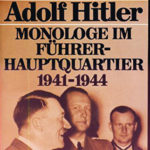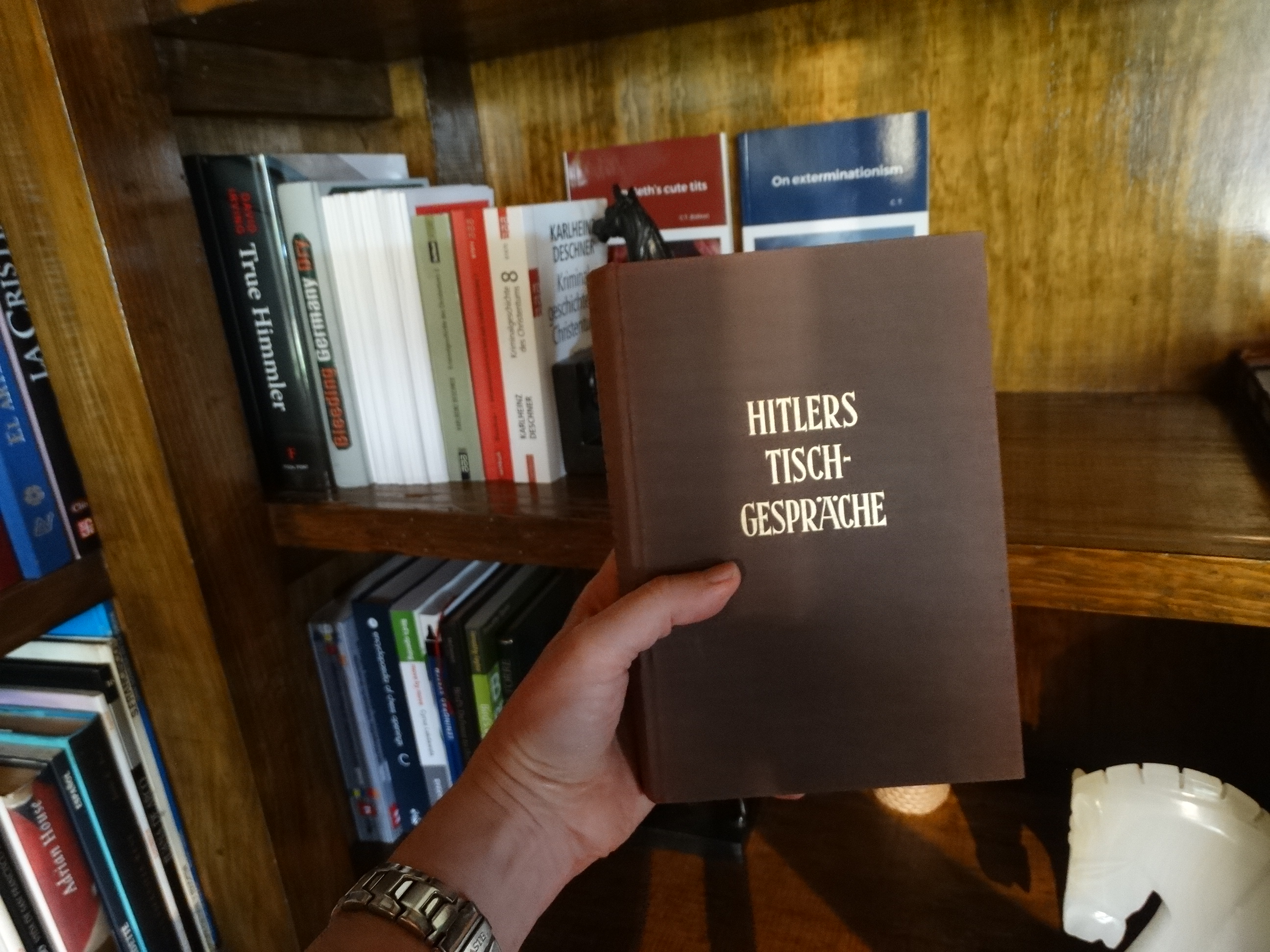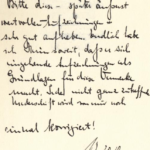 Editor’s note: This site has been promoting Richard Carrier’s work about the dubious historicity of Jesus. But Carrier is a typical neochristian. As Robert Morgan once said, the Christian influence on culture has been so profound that even atheists like Dawkins and Carrier accept the Christian moral framework without question. Carrier’s liberalism has gone so far that he even subscribes the psychosis en mass that a human being can choose his or her sex, disregarding biology.
Editor’s note: This site has been promoting Richard Carrier’s work about the dubious historicity of Jesus. But Carrier is a typical neochristian. As Robert Morgan once said, the Christian influence on culture has been so profound that even atheists like Dawkins and Carrier accept the Christian moral framework without question. Carrier’s liberalism has gone so far that he even subscribes the psychosis en mass that a human being can choose his or her sex, disregarding biology.
Carrier also talks nonsense about Hitler, especially about the Führer’s after-dinner talks. All his rigour as a scholar of 1st-century Mediterranean religions goes out the window when he addresses Hitler’s anti-Christianity. Carrier cheats by deliberately using sloppy English translations instead of the originals (this video featuring David Irving and Richard Weikart explains it briefly).
 Here is my hand holding one of the good German editions, Henry Picker’s, which, unlike the popular translations, wasn’t slightly altered. It is time to refute Carrier’s claim that Hitler wasn’t anti-Christian, although in this new translation I will be using another edition also mentioned in the above-linked video, not the book in my hand. However, the editor’s introduction is too long for a single blog post and I’ll have to divide it into parts (i, ii, iii, etc.). If you want to read it all in the original language, you can do so in the German section of this site.
Here is my hand holding one of the good German editions, Henry Picker’s, which, unlike the popular translations, wasn’t slightly altered. It is time to refute Carrier’s claim that Hitler wasn’t anti-Christian, although in this new translation I will be using another edition also mentioned in the above-linked video, not the book in my hand. However, the editor’s introduction is too long for a single blog post and I’ll have to divide it into parts (i, ii, iii, etc.). If you want to read it all in the original language, you can do so in the German section of this site.
______ 卐 ______
Adolf Hitler
Monologues at the Führer’s Headquarters 1941-1944
– The Records of Heinrich Heim Edited by Werner Jochmann –
Introduction
Shortly after the beginning of the war against the Soviet Union, Reichsleiter Martin Bormann suggested recording Hitler’s conversations during breaks in the Führer’s headquarters. He was guided by the following considerations: After years of unprecedented restlessness with travels, visits, events, intensive consultations with architects, artists, party leaders, representatives of the state, the economy and the Wehrmacht, and after the major foreign policy actions and the first campaigns of the Second World War, the Supreme Commander of the Wehrmacht was now directing operations against the Red Army with his staff from East Prussia. To preserve for posterity the ideas and conceptions he developed in this seclusion and during the most decisive phase of the war so far, Bormann, as head of the party chancellery, asked his adjutant Heinrich Heim to set them down.
On the way home from a lunch meeting with Hitler at the end of June or beginning of July 1941, Heim reports, Bormann suggested that he ‘try to write down from memory an omission we had just heard. What I submitted to the Reichsleiter seemed to him to miss what he was interested in; he therefore made a transcript himself and submitted it to me; inwardly I held fast to my idea, even if I could not reprove his’. Some of the difficulties that had been encountered in this accidental recording of Hitler’s expositions could be overcome by proceeding according to plan. From then on, Heim concentrated intensively on the course and content of the conversations at the table; as far as possible, he also unobtrusively noted down a few keywords, occasionally even the one or other striking sentence. With the help of these notes, he then immediately dictated his notes of the conversation to one of Bormann’s secretaries. During the nightly teatimes, however, to which only a small and intimate circle was invited, there was no opportunity to record even a single word. Since this intimate circle often remained gathered around Hitler until the first hours of the following day, the record of the course of conversation could only be dictated the next morning.
In his casual chats, Hitler frequently changed the subject. Initially, therefore, an attempt was made to systematically summarise remarks on certain problem areas over several days.[1] However, since this procedure lost the immediacy of the statement and it was also impossible to reconstruct the context in which the remarks were to be placed, it was quickly abandoned. The conversations were recorded in their course and in the order in which they took place. As a rule, Hitler spoke alone, usually choosing topics that moved him at the time. In many cases, however, he evaded the pressing problems by distancing himself from the work of the day, for example, in reports from his school days or the early days of the NSDAP. Not every monologue Heim recorded advances the reader’s political insight. But all of them provide an insight into the everyday life of the Führer’s headquarters and the mentality and lifestyle of Adolf Hitler.
Martin Bormann was soon very satisfied with Heim’s work. He saw a collection of material emerging to which he attached great importance. In a memo to the Party Chancellery in Munich, he wrote on 20 October 1941: ‘Please keep these – later extremely valuable – notes very well. I have finally got Heim to the point where he is taking detailed notes as a basis for these memos. Any transcript that is not quite accurate will be corrected by me once again!’ As far as can be seen, there was little cause for correction. In the record published here, the head of the Party Chancellery added only a few additions, which are marked in the text of the edition. The extent to which individual objections and remarks were already taken into account in the final transcription of the notes cannot be established with certainty. According to Heim’s statements, this was not the case, and the findings in the files also speak against it. For each talk note, an original was made, which Heim revised and corrected once more. An original with two carbon copies was made of the final version. The first, signed by Heim in each case, was taken by Bormann, the carbon copies were kept by the heads of the political and constitutional departments of the party chancellery. Some notes dictated and signed by Bormann himself were added to the collection.
Heim’s notes begin on 5 July 1941, are interrupted on 12 March 1942, then continued again from 1 August to 7 September 1942. During Heim’s absence, his deputy, Oberregierungsrat Dr Henry Picker, prepared the talk notes from 21 March to 31 July 1942. At the beginning of September 1942, a serious crisis occurred at the Führer’s headquarters. Hitler was disappointed by the lack of success of Army Group A in the Caucasus. He heaped reproaches on the Commander-in-Chief, Field Marshal List, and his generals. The Chief of the Wehrmacht Joint Staff, Colonel General Jodl, therefore flew to the Field Marshal’s headquarters to get information about the situation on the fronts of the Army Group. On his return to the Führer’s headquarters on 7 September, he recommended to Hitler a cessation of the attack and a withdrawal of the Mountain Corps, which had been particularly far advanced and weakened by the hard fighting.[2] Hitler reacted angrily and accused Field Marshal List of not following his orders and therefore being responsible for the failure. When Jodl, on the other hand, claimed that the Army Group had strictly followed his instructions and thus indicated that the criticism fell back on Hitler, the rupture was sealed.
The consequence of this serious conflict was that from then on Hitler had the briefings recorded by Reichstag stenographers; did not leave his barracks in daylight for long periods and, in particular, no longer ate with the members of the Führer’s headquarters.[3] To what extent his self-confidence received a severe blow from this event, because he realised that his goals in Russia could no longer be achieved, may remain undiscussed in this context. What is decisive is that Hitler henceforth distrusted his officers and showered them with reproaches that shocked even his closest political confidants.[4] Martin Bormann, too, registered with concern that Hitler was closing himself off more and more from those around him.[5] The transcripts end with the abolition of the common table. If there were still conversations in a relaxed atmosphere afterwards, there was hardly any opportunity to record them. The few notes made in 1943/44 by one of Bormann’s advisers, who also added them to the collection of Führer conversations, are summarised – released for publication – in the fourth part of this volume. A glance at these few documents reveals the change in atmosphere that had taken place since September 1942. Hitler no longer spoke so freely, most questions were only touched on briefly.
 Martin Bormann marked his collection of ‘Führer conversations’ as ‘secret’ and sent parts of it to his wife for safekeeping. Gerda Bormann left Obersalzberg on 25 April 1945, after the property had been destroyed in a bombing raid, and took not only her husband’s letters but also the conversation notes with her to South Tyrol. She died there in a prisoner-of-war camp in Merano on 23 March 1946.[6] After the German surrender, an Italian government official in Bolzano took over the entire collection and later sold it to François Genoud in Lausanne, who still owns it. It forms the basis of the present edition.
Martin Bormann marked his collection of ‘Führer conversations’ as ‘secret’ and sent parts of it to his wife for safekeeping. Gerda Bormann left Obersalzberg on 25 April 1945, after the property had been destroyed in a bombing raid, and took not only her husband’s letters but also the conversation notes with her to South Tyrol. She died there in a prisoner-of-war camp in Merano on 23 March 1946.[6] After the German surrender, an Italian government official in Bolzano took over the entire collection and later sold it to François Genoud in Lausanne, who still owns it. It forms the basis of the present edition.
While Henry Picker has meanwhile repeatedly published his conversation notes from the Führer’s headquarters,[7] Heim’s much more extensive notes have so far only been published in foreign languages. A French edition was produced by François Genoud[8] at the beginning of the 1950s; the English edition, by H. R. Trevor-Roper at the same time. This first English edition was followed by a second in 1973; [9] two American editions identical to the English edition had appeared before that.[10] Since these translations of such a central source are much used by international researchers, it is about time that it is finally made accessible in the original text. This is all the more urgent because specific National Socialist terms and also some of Hitler’s linguistic idiosyncrasies can only be translated imperfectly. Attempts to retranslate his remarks have inevitably led to errors that have been to the detriment of the interpretation.
__________
[1] Cf. Gespräch Nr. 28, S. 74.
[2] Colonel General Haider, Kriegstagebuch Vol. III, edited by Hans-Adolf Jacobsen. Stuttgart 1964, p. 518 f. (8. 9. 1942).
[3] Notizen des Generals Warlimont. Kriegstagebuch des OKW, Vol. 2, 1st half volume. Compiled and explained by Andreas Hillgruber. Frankfurt/Main 1963, S. 697.
[4] Heinrich Hoffmann reports on a conversation with Hitler in late summer or autumn 1942, in which Hitler called his officers ‘a pack of mutineers and cowards’. Hoffmann notes: ‘I was deeply affected by this abrupt outburst of hatred. I had never heard Hitler talk like that before’. Heinrich Hoffmann, Hitler, wie ich ihn sah. Munich-Berlin 1974, page 178.
[5] Bormann in letters to his wife Jochen von Lang, Der Sekretär. Stuttgart 1977, page 230.
[6] Death certificate of the registry office I in Berlin. Cf. Joseph Wulf, Martin Bormann. Gütersloh 1962, page 223.
[7] Henry Picker, Hitlers Tischgespräche im Führerhauptquartier 1941-42 (Hitler’s Table Talks at the Fuehrer’s Headquarters 1941-42), ed. by Gerhard Ritter, Bonn 1951. The second edition was supervised by Percy Ernst Schramm in collaboration with Andreas Hillgruber and Martin Vogt. It appeared in Stuttgart in 1963 and was followed in 1976 by a third new edition edited by Picker himself, published by Seewald-Verlag, Stuttgart. The edition edited by Ritter was published in Milan in 1952 in an Italian translation Conversazioni di Hitler a tavola 1941-1942. Andreas Hillgruber supervised the edition published by Deutscher Taschenbuch-Verlag, Munich, in 1968, and in 1979 Goldmann-Verlag in Munich published a paperback edition edited by Picker.
[8] Adolf Hitler, Libres Propos sur la Guerre et la Paix, recueillis sur l’ordre de Martin Bormann. Paris, 1952 and 1954.
[9] Hitler’s Table Talk 1941-44: His Private Conversations. London 1953 und 1973.
[10] Hitler’s Secret Conversations 1941-1944. New York 1953 and 1961.
4 replies on “The Führer’s monologues (i)”
https://youtu.be/bTmvIADT6kM
Good talk by Richard Weikart
What is striking about the interview is that the interviewing Christian cannot see the nobility of Hitler’s pantheism precisely because Christians are theists (a primitive view of ‘God’). And in the case of the neochristian author, his neochristianity prevents him from seeing, too, the greatness of Hitler.
1942 was the crucial year which, had a few top decisions been made differently, could have potentially forced an armistice by the Soviets.
From Robert Forczyk’s Tank Warfare on the Eastern Front, 1941-1942:
“By 10th August, von Kleist had Malinovsky’s forces on the run, with XL.Panzerkorps pushing southeast down the main rail line to Grozny and Baku, while III. and LVII. Pz.K. mopped up around Maikop.
It was at this point that the Germans decided to snatch defeat from the jaws of victory. Field Marshal Wilhelm List was one of Hitler’s uninspired choices to lead his main effort in the 1942 campaign, since he had limited experience with armour – just the brief Balkans campaigns –and had completely missed the first year of the war on the Eastern Front.
List brought an old-school, WW1 mentality to his handling of Army Group A, and he was concerned when von Kleist’s panzers went charging off toward Grozny and Baku, while leaving 17th Army to clear out the Kuban and the coastline. He believed that Soviet forces in these areas posed a threat to his right flank, even though they had minimal combat strength remaining and just fifteen light tanks.
On 12th August List ordered von Kleist to divert both the III. and LVII.Panzerkorps to support a drive westward to Tuapse to cut off the two weak Soviet armies and clear the coast. During 12–18th August, SS-Wiking, the 13.Panzer-Division and the 16.Infanterie-Division were tied up in this ridiculous diversion, which consumed their limited fuel supplies on a secondary objective. List sent this collection of armour down a narrow road into the mountains, which was easily blocked – and they never reached Tuapse.
Meanwhile, von Kleist continued toward Grozny with just 3rd Panzer-Division and part of 23rd Panzer-Division; even though the Wehrmacht had nineteen panzer divisions on the Eastern Front, the schwerpunkt aimed at the critical objectives of the entire summer offensive was reduced to less than two. List diverted much of Army Group A’s limited supplies toward these efforts to clear the coast, leaving von Kleist’s spearhead to sputter for lack of fuel.
[…] Von Kleist realized that time was running out, and he decided to try and get across the Terek River with the forces available. The 3.Panzer-Division managed to seize Mozdok on the northern side of the Terek on 25th August, but efforts to cross the wide river were repulsed.
On the morning of the 26th, General Erwin Mack, commander of the 23.Panzer-Division was killed by Soviet mortar fire while observing operations along the Terek. The river proved too wide, deep and fast-flowing to cross under fire and von Kleist was stymied.
In desperation, Oberst von Bodenhausen, commander of the 23.Panzergrenadier Brigade, was selected to lead a mixed armoured kampfgruppe toward Chervlennaya on the north side of the Terek, where the junction of the Baku-Astrakhan rail line ran. Von Bodenhausen succeeded in reaching the rail junction on 31 August – only 27km from Grozny – and briefly interrupted Soviet rail traffic from Baku (still 490 km distant), but his force was too small to hold this exposed position and he fell back toward the main body.
Von Kleist’s forces were completely out of fuel and he was not able to make another attempt to get across the Terek River until 6th September. The 13.Panzer-Division succeeded in finally getting across the river, but it was too late; Malinovsky’s forces had steadily been reinforced and his numerically-superior troops were too well dug in to budge.
Hitler finally relieved List three days later and took personal control over Army Group A. While fighting would continue along the Terek River until early November, when the first snow arrived, von Kleist’s offensive had culminated, and the front became static.”
In short, Wilhelm List’s diversion doomed von Kleist’s effort to interdict 80% of the Soviet Union’s oil supply.
See how different the war could have panned out?
I have a book that has some of Heim’s notes that Picker had as well as Picker’s own notes translated into English. They are quite a bit different from what’s in the Trevor-Roper edition of the Table Talk.